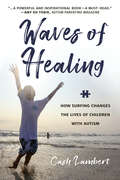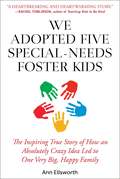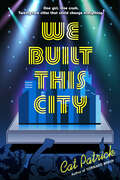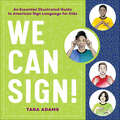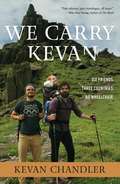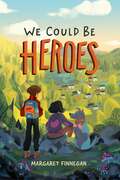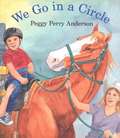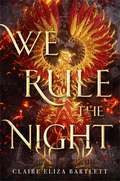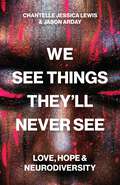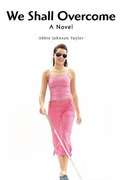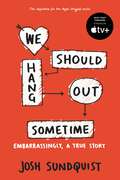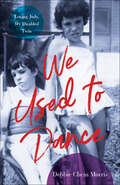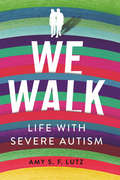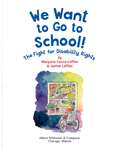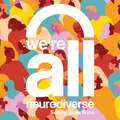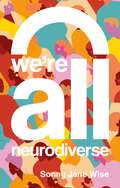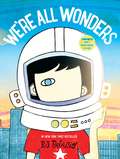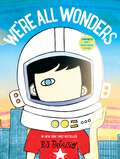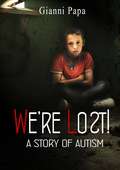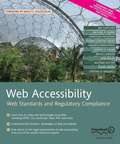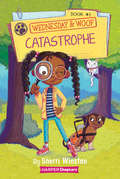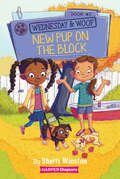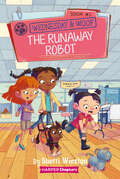- Table View
- List View
Waves of Healing: How Surfing Changes the Lives of Children with Autism
by Cash Lambert“Stand up, up, UP!” is the mantra of Surfers for Autism, an organization that runs surf events for children with autism, providing the opportunity to not only catch waves, but to become part of a supportive surfing community. It is also a message to all those struggling with autism: a message to stand up, no matter how hard it gets. Waves of Healing collects the stories of a group of everyday families who discovered Surfers for Autism in their search for hope, answers, and healing for their children with autism.These are stories about the struggles children with autism face—the struggle to stand on a surfboard, the struggle to communicate, the struggle to make progress in a world which accepts “normal” and rejects all else. But they’re also stories of breakthroughs, of authentic joy and unbridled excitement as they learn to see their world from a whole new perspective—standing tall atop a surfboard, riding a wave all their own.Exploring new avenues of therapy for those with autism, with therapeutic and extraordinary results, Waves of Healing is a snapshot of hope, courage, and human perseverance.
We Adopted Five Special-Needs Foster Kids: The Inspiring True Story of How an Absolutely Crazy Idea Led to One Very Big, Happy Family
by Ann EllsworthA powerful memoir about the joys and pains of making a family.In 2008, Ann and Dan made the life-altering decision to start a family. In their mid-forties and inspired by various stories that they had heard, the couple decided to adopt special needs children through foster care. Not wanting to separate siblings, Ann and Dan&’s family eventually grows to seven, first with the adoption of Jimmy and Ruby, and then Jason, Susie, and Anthony. But, the transition was not without its challenges. The children, aged five to ten years old, had been neglected, abused, and diagnosed with behavioral, cognitive, medical, and psychiatric conditions, none of which could be treated medically. Their first months in their new home were intense, overwhelming, and on occasion, violent. With numerous outbursts and incidents, Ann and Dan&’s patience and resolve were constantly tested. But slowly, when surrounded with stability, warmth, compassion, and love, the children settled in and became a family. Poignant and heartfelt, We Adopted Five Special-Needs Foster Kids is for any reader who has ever been part of a family.
We All Have Different Abilities
by Melissa HigginsWhat can you do? Tie your shoes? Play piano? Everyone has different talents and abilities. Let's share and celebrate our many talents
We Built This City
by Cat PatrickAward-winning author Cat Patrick returns with a charming tale full of first crushes and new friendships, as one girl learns a little more about who she is and who she wants to be all while on the road trip of lifetime.It&’s the summer of 1985, when air guitar, jelly bracelets, and huge hair are all the rage, and twelve-year-old Stevie is finally old enough to go on her performing troupe&’s annual cross-country tour. Twenty-six teen cast members will lip-synch and dance their way through more than twenty cities, and Stevie and her best friend, Wes, can&’t wait—for more reasons than one!
We Can Sign!: An Essential Illustrated Guide to American Sign Language for Kids
by Tara AdamsEasy signing is in your hands—an illustrated guide for kids ages 8 to 12Discover how simple learning sign language for kids can be! Whether it's for reaching out to a Deaf person, chatting with friends across a crowded room, or just learning an amazing new language, We Can Sign! is an essential guide to getting started with American Sign Language for kids.Bursting with almost 200 fully-illustrated signs, memory tips, and more, this instructional aid for sign language for kids makes mastering ASL easy. Ten chapters take you all the way from sign language basics and conversation phrases to must-have vocab. Get signing today!We Can Sign! An Essential Illustrated Guide to American Sign Language for Kids includes:Up-to-date info—Learn the most modern version of American Sign Language—while also getting fun insight into Deaf culture.Clear illustrations—Start signing fast with detailed drawings that show exactly how each sign should look.182 signs you need—Lessons begin simple and progress to more advanced ideas as you learn words and phrases that are perfect for use in a variety of situations.Get a helping hand with this fully illustrated guide to sign language for kids!
We Carry Kevan: Six Friends. Three Countries. No Wheelchair.
by Kevan ChandlerKevan is just one of the guys. It's impossible to know him and not become a little more excited about life. He is an inspiring man permeated by joy, unafraid of sorrow, full of vitality and life! His sense of humor is infectious and so is his story.He grew up, he says, at "belt-buckle level" and stayed there until Kevan's beloved posse decided to leave his wheelchair at the Atlanta airport, board a plane for France, and have his friends carry him around Europe to accomplish their dream to see the world together! Kevan's beloved posse traveled to Paris, England, and Ireland where, in the climax of their adventure, they scale 600 feet up to the 1,400-year-old monastic fortress of Skellig Michael.In WE CARRY KEVAN the reader sits with Kevan, one head-level above everyone else for the first time in his life and enjoys camaraderie unlike anything most people ever experience. Along the way they encounter the curiosity and beauty of strangers, the human family disarmed by grace, and the constant love of God so rich and beautiful in the company of good friends. WE CARRY KEVAN displays the profound power of friendship and self-sacrifice.
We Could Be Heroes
by Margaret FinneganShiloh meets Raymie Nightingale in this funny and heartwarming debut novel about a ten-year-old that finds himself in a whole mess of trouble when his new friend Maisie recruits him to save the dog next door.Hank Hudson is in a bit of trouble. After an incident involving the boy&’s bathroom and a terribly sad book his teacher is forcing them to read, Hank is left with a week&’s suspension and a slightly charred hardcover—and, it turns out, the attention of new girl Maisie Huang. Maisie has been on the lookout for a kid with the meatballs to help her with a very important mission: Saving her neighbor&’s dog, Booler. Booler has seizures, and his owner, Mr. Jorgensen, keeps him tied to a tree all day and night because of them. It&’s enough to make Hank even sadder than that book does—he has autism, and he knows what it&’s like to be treated poorly because of something that makes you different. But different is not less. And Hank is willing to get into even more trouble to prove it. Soon he and Maisie are lying, brown-nosing, baking, and cow milking all in the name of saving Booler—but not everything is as it seems. Booler might not be the only one who needs saving. And being a hero can look a lot like being a friend.
We Go in a Circle
by Peggy Perry AndersonWhat happens to a racehorse who hurts his leg? Used to a world where the strongest and the fastest wins, how will he ever feel special and important again? Taken to a new place, the horse is soon carrying some very special riders. Some of them can’t walk and some of them can’t even see, but they play games, they wave, they smile. Like the horse, they may not be the strongest and the fastest, but they are all special and important. In this simple and sensitive story, Peggy Perry Anderson reveals the interconnection between everyone involved in hippotherapy and the benefits they all share from the experience.
We Rule the Night
by Claire Eliza BartlettTwo girls use forbidden magic to fly and fight--for their country and for themselves--in this riveting debut that's part Shadow and Bone, part Code Name Verity.Seventeen-year-old Revna is a factory worker, manufacturing war machines for the Union of the North. When she's caught using illegal magic, she fears being branded a traitor and imprisoned. Meanwhile, on the front lines, Linné defied her father, a Union general, and disguised herself as a boy to join the army. They're both offered a reprieve from punishment if they use their magic in a special women's military flight unit and undertake terrifying, deadly missions under cover of darkness. Revna and Linné can hardly stand to be in the same cockpit, but if they can't fly together, and if they can't find a way to fly well, the enemy's superior firepower will destroy them--if they don't destroy each other first.We Rule the Night is a powerful story about sacrifice, complicated friendships, and survival despite impossible odds.
We See Things They’ll Never See: Love, Hope, and Neurodiversity
by Jason Arday Chantelle Jessica LewisHow neurotypical hegemony reproduces a culture of exclusion—and how to overcome this with love, hope, and solidarityAbleism is embedded in our daily lives. Social life, education, work, and, especially, mental health have been organized around rigid ideas of the &“ideal&” and the &“normal&” citizen—ideas that always exclude neurodiversity. In this pathbreaking book, Chantelle Jessica Lewis and Jason Arday argue that the neurodiversity movement offers ways to mobilize against not only ableism but also other &“isms&” including racism and capitalism. By focusing on the prevalence of neurotypical dominance and power—or &“neurotypical hegemony&”—Lewis and Arday show the ways that neurotypical dominance has often been used to justify and normalize some of our more harmful cultures around productivity and value.Throughout the book, Lewis and Arday use theories of Blackness, feminism, class, and neurodivergence to offer a vision of solidarities across differences. They show that race, class, ethnicity, gender, and nation are just some of the social structures for which the politics of neurodiversity can produce an emancipatory analysis. This is a book about applying social theory in practice, taking seriously how academic research and theory can be used outside of academic spaces. With We See Things They&’ll Never See, Lewis and Arday issue a call to action—and a call for understanding, acceptance, and humility.
We Shall Overcome
by Abbie Johnson TaylorThe story of Lisa Taylor, a visually impaired woman, who struggles to overcome her fears in order to find love.
We Should Hang Out Sometime: Embarrassingly, a true story
by Josh Sundquist<P>When I was twenty-five years old, it came to my attention that I had never had a girlfriend. At the time, I was actually under the impression that I was in a relationship, so this bit of news came as something of a shock.Why was Josh still single? To find out, he tracked down each of the girls he had tried to date since middle school and asked them straight up: What went wrong? <P>The results of Josh's semiscientific investigation are in your hands. From a disastrous Putt-Putt date involving a backward prosthetic foot, to his introduction to CFD (Close Fast Dancing), and a misguided "grand gesture" at a Miss America pageant, this story is about looking for love-or at least a girlfriend-in all the wrong places.Poignant, relatable, and totally hilarious, this memoir is for anyone who has ever wondered, "Is there something wrong with me?" <P>(Spoiler Alert: the answer is no.)
We Used to Dance: Loving Judy, My Disabled Twin
by Debbie Chein MorrisDebbie and Judy are twins—but Judy was born with cerebral palsy, and Debbie was not. Despite the severity of Judy’s brain damage, her parents chose to keep her at home with her three siblings, and ultimately Judy lived at home with them well into adulthood. Even after her father died, she continued to stay with her mother, her care augmented by a succession of home attendants—until, that is, her doctor told Debbie that Judy’s care at home was wanting and she would not survive without nursing home care.In We Used to Dance, Debbie tells of the emotional trauma she experienced when she was forced to place her sister—a sister unable to sit, stand, eat regular food, feed herself, use a bathroom, or make her needs and desires known through speech or other means—in a new and strange environment. Following Judy’s life in her new home as well as her past relationship with Debbie and the rest of their immediate family, this is a raw, personal memoir of love and guilt—and, ultimately, acceptance.
We Walk: Life with Severe Autism (The Culture and Politics of Health Care Work)
by Amy S. LutzIn this collection of beautiful and raw essays, Amy S. F. Lutz writes openly about her experience—the positive and the negative—as a mother of a now twenty-one-year-old son with severe autism. Lutz's human emotion drives through each page and challenges commonly held ideas that define autism either as a disease or as neurodiversity. We Walk is inspired by her own questions: What is the place of intellectually and developmentally disabled people in society? What responsibilities do we, as citizens and human beings, have to one another? Who should decide for those who cannot decide for themselves? What is the meaning of religion to someone with no abstract language? Exploring these questions, We Walk directly—and humanly—examines social issues such as inclusion, religion, therapeutics, and friendship through the lens of severe autism. In a world where public perception of autism is largely shaped by the "quirky geniuses" featured on television shows like The Big Bang Theory and The Good Doctor, We Walk demands that we center our debates about this disorder on those who are most affected by its impacts.
We Want to Go to School!: The Fight for Disability Rights
by Maryann Cocca-Leffler and Janine LefflerThe true story of the people who helped make every public school a more inclusive place. There was a time in the United States when millions of children with disabilities weren't allowed to go to public school. But in 1971, seven kids and their families wanted to do something about it. They knew that every child had a right to an equal education, so they went to court to fight for that right. The case Mills v. Board of Education of the District of Columbia led to laws ensuring children with disabilities would receive a free, appropriate public education. Told in the voice of Janine Leffler, one of the millions of kids who went to school because of these laws, this book shares the true story of this landmark case.
We'll Paint the Octopus Red
by Stephanie Stuve-BodeenAs six-year-old Emma anticipates the birth of her new baby brother or sister, she vividly imagines all of the things they can do together. Emma feels ready to be a big sister! Then when the baby is born, her dad tells her that it's a boy and he has something called Down syndrome. Finally she asks, "If Isaac has this Down thing, then what can't he do?". Her dad thinks about it, then tells her that as long as they are patient with him, and help him when he needs it, there probably isn't anything Isaac can't do. In this touching story, Emma helps her father as much as he helps her to realise that Isaac is the baby they dreamed of. The book concludes with a set of commonly asked questions about Down syndrome with answers for children and how it might affect their sibling and family. For ages 3-7.
We're All Neurodiverse: How to Build a Neurodiversity-Affirming Future and Challenge Neuronormativity
by Sonny Jane Wise"Neurodiversity has helped me understand myself and provided a sense of relief that I'm a whole neurodivergent person functioning as my brain intends.""It's provided me with the language to advocate for myself.""I no longer hated myself. I no longer felt broken. I found a sense of community. A sense of belonging"This affirming and thoughtful guide outlines how and why we need to fundamentally shift our thinking about neurodivergent people. We need to accept differences rather than framing them as a problem, abnormality or disorder. Welcome to the neurodiversity paradigm.At times challenging and radical, Sonny Jane Wise explores the intersections of neurodivergence with disability, gender, sexuality and race. Through interviews, narratives, and the lens of their own raw experiences, they consider how current systems and structures that impact neurodivergent people are rooted in outdated capitalist and racist frameworks, and how these need to change and adapt to be neurodiversity affirming. Sonny Jane's words are a rallying cry to challenge the pathology paradigm. They offer nine principles for facilitating change, reflected in deeply personal stories from the neurodivergent community.Powerful and persuasive, this book is a clarion call for a kinder and more neurodiversity affirming society.
We're All Neurodiverse: How to Build a Neurodiversity-Affirming Future and Challenge Neuronormativity
by Sonny Jane Wise"Neurodiversity has helped me understand myself and provided a sense of relief that I'm a whole neurodivergent person functioning as my brain intends.""It's provided me with the language to advocate for myself.""I no longer hated myself. I no longer felt broken. I found a sense of community. A sense of belonging"This affirming and thoughtful guide outlines how and why we need to fundamentally shift our thinking about neurodivergent people. We need to accept differences rather than framing them as a problem, abnormality or disorder. Welcome to the neurodiversity paradigm.At times challenging and radical, Sonny Jane Wise explores the intersections of neurodivergence with disability, gender, sexuality and race. Through interviews, narratives, and the lens of their own raw experiences, they consider how current systems and structures that impact neurodivergent people are rooted in outdated capitalist and racist frameworks, and how these need to change and adapt to be neurodiversity affirming. Sonny Jane's words are a rallying cry to challenge the pathology paradigm. They offer nine principles for facilitating change, reflected in deeply personal stories from the neurodivergent community.Powerful and persuasive, this book is a clarion call for a kinder and more neurodiversity affirming society.
We're All Wonders
by R. J. PalacioWe’re All Wonders may be Auggie’s story, but it taps into every child’s longing to belong, and to be seen for who they truly are. It’s the perfect way for families and educators to talk about empathy and kindness with young children.
We're All Wonders (Wonder)
by R. J. PalacioThe unforgettable bestseller Wonder has inspired a nationwide movement to Choose Kind. Now parents and educators can introduce the importance of choosing kind to younger readers with this gorgeous picture book, featuring Auggie and Daisy on an original adventure, written and illustrated by R. J. Palacio. Over 6 million people have fallen in love with Wonder and have joined the movement to Choose Kind. Now younger readers can meet Auggie Pullman, an ordinary boy with an extraordinary face, and his beloved dog, Daisy. Countless fans have asked R. J. Palacio to write a book for younger readers. With We&’re All Wonders, she makes her picture-book debut as both author and artist, with a spare, powerful text and striking, richly imagined illustrations. Palacio shows readers what it&’s like to live in Auggie&’s world—a world in which he feels like any other kid, but he&’s not always seen that way. We&’re All Wonders may be Auggie&’s story, but it taps into every child&’s longing to belong, and to be seen for who they truly are. It&’s the perfect way for families and educators to talk about empathy and kindness with young children.Praise for Wonder:A #1 New York Times BestsellerA USA Today Top 100 BestsellerAn Indie BestsellerA Time Magazine 100 Best Young Adult Books of All Time SelectionA Washington Post Best Kids&’ BookA Parents Magazine Top 10 Book of the YearA New York Times Book Review Notable BookAn NPR Outstanding Backseat Book Club PickAn Entertainment Weekly 10 Great Kids&’ Books SelectionA Publishers Weekly Best Book of the YearA School Library Journal Best Book of the YearA Kirkus Reviews Best Book of the YearA Booklist Editors&’ ChoiceAn E. B. White Read Aloud Award WinnerAn ALA Notable BookA Bank Street Best Book of the YearAn IRA-CBC Teachers&’ ChoiceA New York Public Library 100 Titles for Reading and Sharing SelectionA Christopher Award Winner&“A beautiful, funny and sometimes sob-making story of quiet transformation.&” —The Wall Street Journal&“A crackling page-turner filled with characters you can&’t help but root for.&” —Entertainment Weekly&“Rich and memorable.&” —The New York Times Book Review&“Wonder is the best kids&’ book of the year.&” —Slate.com&“A glorious exploration of the nature of friendship, tenacity, fear, and most importantly, kindness.&” —The Huffington Post&“Endearing, enduring Auggie and his family and friends will find a place in the hearts of readers and prompt reflection on how we treat others.&” —The Washington Post
We're Lost! A Story of Autism
by Margaret Leah McCall Wood Gianni PapaA unique story of autism, where the autistic child is not only the central character but also the narrator and the witness to a harrowing sequence of events. In WE'RE LOST an autistic child tells the story of his difficult birth, the "very good" and terribly optimistic neuropsychiatrist, the diagnosis by a specialist Catholic clinic, the broken dreams of rehabilitation, the clash with reality, the disappointment. The most authentic novel ever written about the plight of families with autism.
Web Accessibility: Web Standards and Regulatory Compliance
by Jim Thatcher Cynthia Waddell Mark Urban Andrew Kirkpatrick Richard Rutter Christian Heilmann Shawn Lawton Henry Patrick H. Lauke Bruce Lawson Bob Regan Michael R. BurksThe power of the Web lies in the fact that anyone and everyone can access it. However, this should also extend to users with disabilities--accessibility is about making websites accessible to those with aural, visual, or physical disabilities, or rather, constructing websites that don't exclude these people from accessing the content or services being provided. This isn't difficult to do, and doesn't require anything more than your normal toolset, be it HTML, CSS, JavaScript, Flash, or whatever else. All you need to do is use these tools in the right way, and bear in mind the guidelines that exist to help you keep your web sites accessible, and the laws that enforce web accessibility around the world. This book gives you all you need to know about web accessibility, whether you are a web designer or developer who wants their sites to be accessible, or a business manager who wants to learn what impact the web accessibility laws have on their businesses' web sites.
Wednesday and Woof #1: Catastrophe (HarperChapters)
by Sherri WinstonCan Wednesday and her service dog, Woof, sniff out Mrs. Winter’s missing cat before her big trip? This is the first book of a fun full-color early chapter book series about the best detectives in the Midwest!Detective Tip #1 Try not to jump to conclusions. Wednesday and her service dog, Woof, are the best detectives in the whole world—or at least their neighborhood. But can they find Mrs. Winters’s missing cat before her big trip? Or will the case of the cat-napped kitty be their first unsolved mystery? HarperChapters build confident readers one chapter at a time! With short, fast-paced books, art on every page, and milestone markers at the end of every chapter, they're the perfect next step for fans of I Can Read!
Wednesday and Woof #2: New Pup on the Block (HarperChapters)
by Sherri WinstonCould a friend really have taken Wednesday’s brother’s prized possession? Wednesday and her service dog, Woof, take the case in the second book of this full-color early chapter book series about the best detectives in the Midwest!Detective Tip #2 Don’t forget to use your eyes, ears, and even your nose. Wednesday’s brother’s drone went missing in their own backyard. And that can mean only one thing—the thief is one of their friends! Can the neighborhood’s newest service dog help Wednesday and Woof sniff out the bandit? Or will the case of the missing drone be a doggone disaster?HarperChapters build confident readers one chapter at a time! With short, fast-paced books, art on every page, and milestone markers at the end of every chapter, they're the perfect next step for fans of I Can Read!
Wednesday and Woof #3: The Runaway Robot (HarperChapters)
by Sherri WinstonIt’s a double mystery when a robot and a hamster go missing before the science fair in the third book of this full-color early chapter book series about the best detectives in the Midwest!Detective Tip #3: Use your imagination and stay calm!When a classmate’s DIY robot goes missing right before the school Science Fair, Detective Wednesday Nadir and her service dog, Woof are sure they can find it…until the class hamster also disappears! Now the pressure is on! Can Wednesday and Woof use the scientific method to solve two cases at once—or will the stress cause a mess?HarperChapters build confident readers one chapter at a time! With short, fast-paced books, art on every page, and milestone markers at the end of every chapter, they're the perfect next step for fans of I Can Read!
